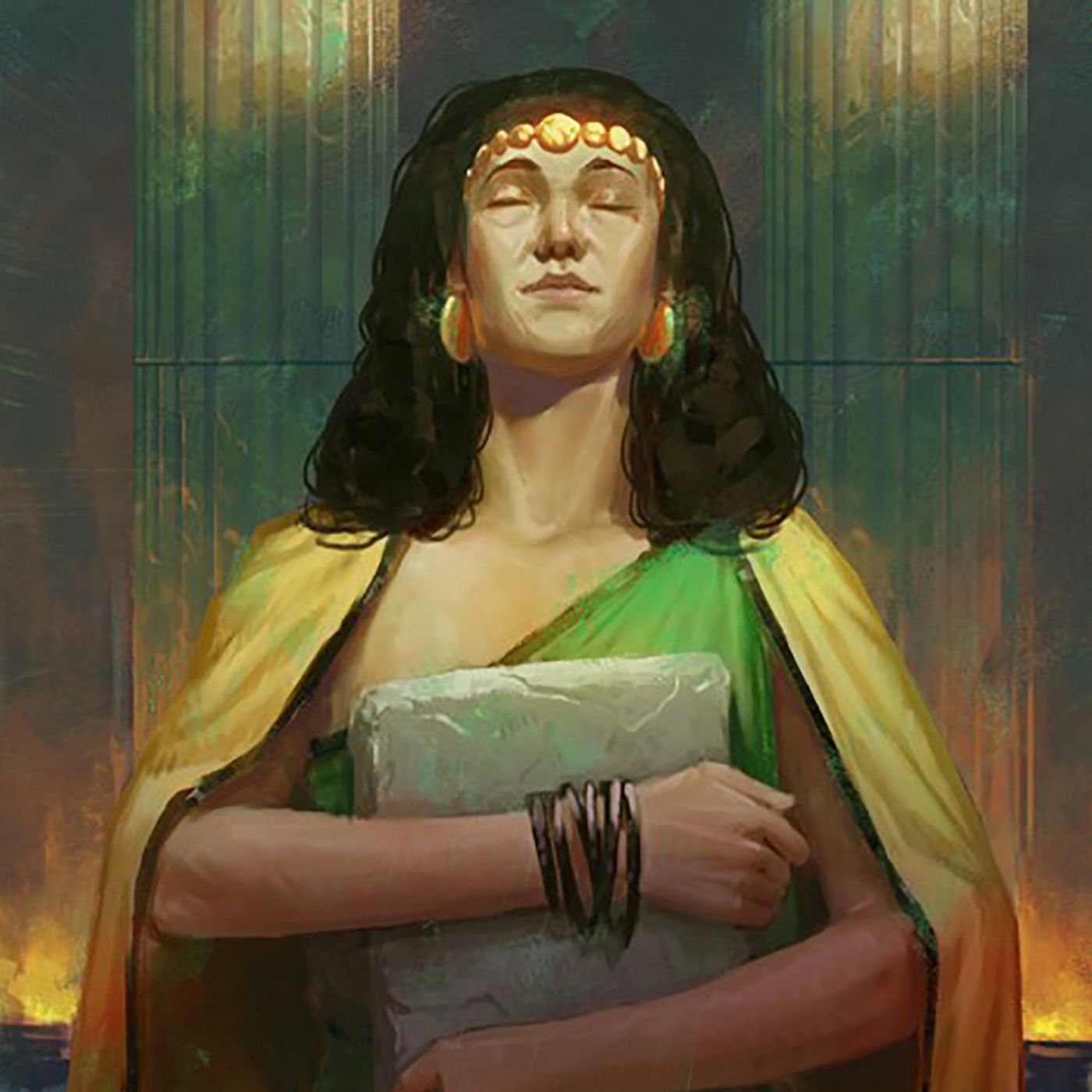Show Notes
Enheduanna is the first of my goddesses who is a recorded historical figure, and by that I mean we know of her existence beyond anecdotes or religious legend. Enheduanna was the high priestess of Mesopotamia, placed in that position by her father Emperor Sargon. In that role she composed prayers and hymns, to which she signed her name. Her story is from a time when the written language was in its infancy and most authors remained anonymous. Enheduanna not only changed that but wrote prayers that were so profound that they were spoken long after her death and helped shaped prayers and psalms into the modern era.
Show Transcript
Her story begins in the ancient lands of Mesopotamia, within the kingdom now known as Iraq.
The Emperor Sargon had been waiting within his salon for news of the birth of his child, when finally a midwife arrived with a tiny mewing bundle within her arms. She bowed and then handed the emperor his baby daughter to hold for the first time.
The baby’s eyes were open and as they connected with her father’s his face broke into a joyous grin.
“Inanna has arrived within my palace,” he declared, believing the spirit of the holy mother goddess had blessed his daughter’s arrival.
Though the princess was given a name that day it would not be the one she would be known for or remembered by. Nor would her role as a royal daughter for it seemed that Inanna had written a bigger story for the princess.
When Enheduanna was born her father, Sargon was well established as Emperor. Rising to become King of Akkadia he had crossed his own kingdom amassing a huge army, then stormed into neighbouring Sumer. With a blaze of battles, he conquered the chieftains of its states, so that when he eventually surrounded the palace of the Sumerian king, his victory in claiming the crown was inevitable.
So it was that the union of Akkadia and Sumer gave birth to Mesopotamia and Enheduanna grew up in an empire that was still in its youth.
Sargon had declared his rule blessed by the gods and there were many deities that his empire embraced. Whilst her brothers learned of warfare and taxes, Enheduanna learned the rituals and celebrations of the vast array of idols. It was an education she revelled in, with the priests and priestesses who tutored her often declaring that she had divine connections that allowed her the ease of learning about them. They could feel her devotion was beyond that of a mind wishing to collect information.
For Enheduanna there was more truth in this than anyone imagined. As she sat and heard the stories of each god, she did not picture them as someone sitting in the heavens. Enheduanna saw them walking beside her. She heard their voices tell her what they wanted her to know of them. She felt their love and how they ached for it to be known by each and every person.
Each divine being had so many gifts to offer to the mortals who walked the Earth, but for many their wisdom was lost in the complexities of a disjointed faith. A god could have one name in the north, but another in the south. For many their history had been distorted through years of oral recitation, and so too one God could have differing stories told about them depending on where they were being spoken of.
Further to this disharmony, it seemed that ceremonies and prayer were no longer connecting people to the divine; instead, they were being acted out as a duty and tradition instead of the holy act of devotion and reflection they began as.
This was the world of religion that Enheduanna would soon be sent to see over.
As she stepped into womanhood the princess was deemed by her tutors as being whole in her knowledge. The grand priests and priestesses met with Sargon to let him know that his daughter’s education with them was complete.
“Sire, she knows the names of all the Gods and Goddesses as well as their stories. The princess can recount as much as any priest or priestess in any temple within the kingdom,” they declared.
Sargon nodded and his chest swelled with pride. Then the elders continued.
“You should also know that the princess holds a wisdom that few of our peers possess. It is one that comes not from simply learning. The royal daughter holds each of the gods and goddesses within her heart. That cannot be taught. That, your highness, was within her from birth.”
The emperor smiled as he remembered the first time he held his daughter just moments after her arrival. He had called out Inanna’s name as he looked into her eyes and now he knew that was not by whim or the surge of love that had swept over him as he embraced his newborn child. The holy mother had indeed sent her very spirit to live within his daughter.
Having that belief validated by the priests and priestesses who taught her, Sargon now knew Enheduanna’s future should both acknowledge and harness her gift.
In the capital Ur, not far from the palace was the grandest of all the temples within the empire. It was here that the most respected and experienced priests and priestesses served the gods, as well as the emperor; and it was here that Enheduanna would take upon the role of High Priestess as declared by her father and endorsed by the elders.
At the palace she shed her royal clothing and jewels and her maids slipped over her head the tunic of a priestess. As it fell down around her body, Enheduanna felt her life begin to transform, and when the simple cord that was her belt tightened around her waist that change seemed to be set in place.
There were no tears from her eyes as she walked out of the palace, and she climbed into the carriage waiting for her without hesitation or doubt. In fact, as the driver called to the horses to begin the short journey she smiled.
That smile remained as she alighted and the Grand Priests and Priestesses of the temple greeted her.
“Welcome Princess,” they called out and Enheduanna did not hesitate to reply.
“That title is no more. I do not arrive here as Princess. She remains at the palace. Before you stands a priestess and I will be known as Enheduanna and no other title.”
Though she did not arrive as a princess, Enheduanna’s royal upbringing still showed itself. An emperor’s blood still flowed through her and her connection to the deities was matched by an innate ability to lead, so that not one person within the temple questioned her leadership.
Now this could seem like a recipe for a dictatorial energy, but Enheduanna was far from being consumed by power. Under her direction the temple thrived as a place of equality and respect. No matter your gender, or sexuality, you were seen as equal and valuable. For Enheduanna knew that only Inanna decided who and what a person should be when the eternal mother birthed their soul.
Priests and priestesses dressed alike or to what gender appealed to them in that moment. There was a fluidity that was natural and beautiful. It was such an inherent way of being in service that each priest and priestess knew they were valued for what they offered from their heart rather than what was expected of their gender or age. As this disposal of human definitions freed their service, so too did it free their consciousness and awareness, allowing them to transcend the limits of their human mind.
This freedom allowed each member of the clergy to find their unique connection to the gods, just as Enheduanna had done as a child. For when the priests and priestesses were able to look at each other as their essence rather their appearance or story then they could also do this with the deities.
So it was that Enheduanna began with the Goddesses. They looked to the myriad of stories being told about the divine women and the high priestess asked that they let go of the legends and their rituals; instead asking that the very spirit of the Goddesses be felt instead. Some would sit in front of statues, still and silent. While others sat before fires and let the flames connect them to the goddess energy.
Soon they all started to share what Enheduanna had known for years. Each Goddess was simply an expression of the Holy Mother. From Inanna they were born and each one was a manifestation of her divine love.
This revelation swept across the empire and was embraced by every temple. There was no revolt and no resistance. For these aspects of Inanna were not being erased or diminished. Instead, they were being united and within this union the reverence and worship of Inanna grew.
The grand temple led by Enheduanna was seen as the source of this devotion; while across the empire, the smaller temples now became satellites of worship, serving local communities and allowing the reformed faith to flow out to all. So it was that as her father had united the clans and tribes into his empire, now had his daughter united the temples into a refreshed faith.
Idols whose origins were long forgotten but still mechanically revered were set aside as Inanna and those Gods who supported her story gained strength and meaning. No longer did a story differ depending which region you rode through. If you arrived at a temple now you would see the same idols as those of your home village or city.
Enheduanna knew that statues and carvings were but one expression of worship, because for centuries now prayers and hymns were also an integral part of this also. How beautiful it would be if all the people would show their devotion with their voices as unified as their hearts now were.
As Enheduanna breathed these very thoughts the written language was only in its beginnings. Having started as a means of counting stock and now developing through the necessities of trade across the empire, this evolving method of communication was ready for its next stage and Enheduanna would prove to be more than worthy of being one of its pioneers.
Words flowed easily for the high priestess. Some days they felt as though Inanna was speaking through her, and other days it was the very passion she had for her worship that allowed the language to come to her. For Enheduanna scraping her stylus across the clay was a ritual in and of itself. Her only frustration was that she could not make the markings quick enough.
Patience with this though also taught her much. For by slowing down the flow of words she felt them even deeper. It was as though Inanna was infusing each mark with her love. How could Enheduanna want to push that any quicker? Instead, as she pressed the lines, curves and dots into the soft tablet she revelled in the energy that didn’t just create the writing, but the divine essence that had driven her to create them.
When she completed her first grand hymn to Inanna and it was engraved into the clay, she looked upon the words and thanked the holy mother for her direction and inspiration. It was then that she felt Inanna whisper to her, “This is born of my love, but these are your words.”
For indeed the high priestess had written as though she was speaking to the holy mother directly. This was not a writing of instruction, nor of rules. This was a correspondence, sharing what was within her heart for the Goddess.
It was then that the high priestess added one more line. That line read- “The person who put this tablet together is Enheduanna”
Enheduanna’s prayers and hymns could now be replicated with authenticity and carried across the lands, reinforcing the unity and cohesion that had already begun within the faith. As each priest, priestess and worshipper repeated the words, then they too entered a personal correspondence with the gods. Their devotion become direct and intimate with the divine energies.
Admiration of the high priestess grew as all who worshiped the newly unified gods felt the passion and love within the words that strengthened their own faith. However not everyone celebrated this new era being led by Enheduanna. For whilst the high priestess had helped her father soothe tribal unrest for the majority of people, there were still some who wished to challenge Sargon’s family reign.
Lugal-Ane had slowly been gathering allies on the outskirts of the empire. His words of uprising were whispered amongst the people who wished their lands be once more under a Sumerian king and not these Akkadian war mongers. So it was that Lugal-Ane’s rebellion gained momentum and just as Sargon had circled the palace at Ur to claim the crown, now Sargon’s son and heir surrendered and met his fate.
Lugal-Ane was swift to un-do any remnants of Sargon’s reforms and high on this list was the leadership of the Grand Temple.
Enheduanna heard of the emperor’s demise and though tears fell from her face, she walked with her shoulders square and her head held high as she went to meet the commanders sent to address her. She knew what happened to women in war, but more so she had supreme faith that Inanna would protect her and carry her spirit on should the soldiers wish to end her entirely.
The priestess was neither raped or killed, for the men had good sense to know how such actions would be viewed by the congregation; and a new emperor needs all the support he can muster. Instead Enheduanna was walked down the steps of the temple to an awaiting carriage. The same steps she had ascended to lead, now she descended to be taken into exile.
Cast out of her temple and home, Enheduanna fled to a small village at the foothills of some mountains. She remained stoic and poised, wishing to be an example of strength to the handful of priests and priestesses allowed to leave with her, as well as to the villagers who had welcomed her with open arms, a warm bed and ample food.
She collapsed upon her bed after the long dusty and bumpy carriage ride and after whispering a prayer of thanks to Inanna for her life and safety, fell into a deep sleep.
As Enheduanna slept she dreamt of all that had occurred with Lugal-Ane’s rebellion. Though in her dream she watched it acted out before her as though it was a play. She felt a presence beside her and turned to see Inanna standing there. The Goddess looked into Enheduanna’s eyes and though they did not speak to each other there was an exchange that was beyond words.
When she woke the next day the energy of that exchange was still with the high priestess. She looked out to the mountains, and they reminded her of the protection that Inanna had always given to her. So many times as she grew up, Sargon had told her how he had seen the holy mother within her through her newborn eyes.
Inanna had always been with her and would never leave her.
So Enheduanna called out to Inanna now and she did it in the most powerful way that she knew: through a written prayer.
Within the words she spoke of the injustice of the rebellion, the inhumanity of her exile and she implored the goddess to correct these wrongs. This though was far more than a prayer. It was also a declaration of Enheduanna’s allegiance to her family’s rule and a record of this moment in history. Once more upon its completion Enheduanna signed her name to the prayer.
Only a few weeks passed before news of a counter rebellion reached her small village. Sargon’s grandson had retaken the throne for the family and was now Emperor of the kingdom his grandfather had begun. The new leader now sent word to his aunt, Enheduanna, to return to Ur and once more lead the temple.
When she heard that Inanna had answered her prayer, Enheduanna fell to her knees and spoke her thanks to the goddess for once more granting her divine love and power upon her life.
It was not long before Enheduanna once more walked up the stairs of her grand temple as its rightful leader. Here she would remain until her final years. Even when the emperor passed on his kingdom to his son, the new ruler asked Enheduanna to remain as High Priestess. So it was that she taught, prayed and wrote here for forty years, finally being laid to rest in a cemetery not far from her beloved temple.
Those forty years were filled with reverence and respect for all that she did, so that her words can still be read over four thousand years later. Carvings of her figure show her importance amongst not just the priesthood but the ruling class as well. Her writing doesn’t just endure due to archaeology; for the structure of her prayers is still followed within modern prayers and psalms. Most delightful is that in acknowledging herself by putting her name to her writing, Enheduanna is the first recorded author known by name.
I am going to finish by sharing some of her words, written around 2,300BC, so we can hear from Enheduanna in her own words;
“Inanna the Exalted,
who has made me tremble together with all Ur!
Stay Her anger, or let Her heart be soothed by my supplications!
I, Enheduanna will offer my supplications to Inanna,
my tears flowing like sweet intoxicants!
Yes, I will proffer my tears and my prayers to the Holy Inanna,
I will greet Her in peace ...
O My Queen, I have exalted You,
Who alone are worthy to be exalted!
O My Queen, Beloved of An,
I have laid out Your daises,
set fire to the coals,
conducted the rites,
prepared Your nuptial chamber.
Now may Your heart embrace me!
These are my innovations,
O Mighty Queen, that I made for You!
What I composed for You by the dark of night,
The cantor will chant by day.
Now Inanna’s heart has been restored,
and the day became favorable to Her.
Clothed in beauty, radiant with joy,
she carried herself like the elegant moonlight.
Now to the Noble Hierodule,
to the Wrecker of foreign lands
presented by An with the seven divine powers,
and to my Queen garbed in the radiance of heaven ...
O Inanna, praise!
The person who put this tablet together
is Enheduanna.”
Excerpt taken from The Exaltation of Inanna
Nin-me-šara by Enheduanna
loose translation/interpretation by Michael R. Burch
Listen to the audio of this story at
https://www.spreaker.com/user/8255993/enheduanna
©2021 Marisa Calvi
Translations and sharing are allowed,
if no fee is charged and that proper credit is given to its source.
Listen On
Also Listen
-
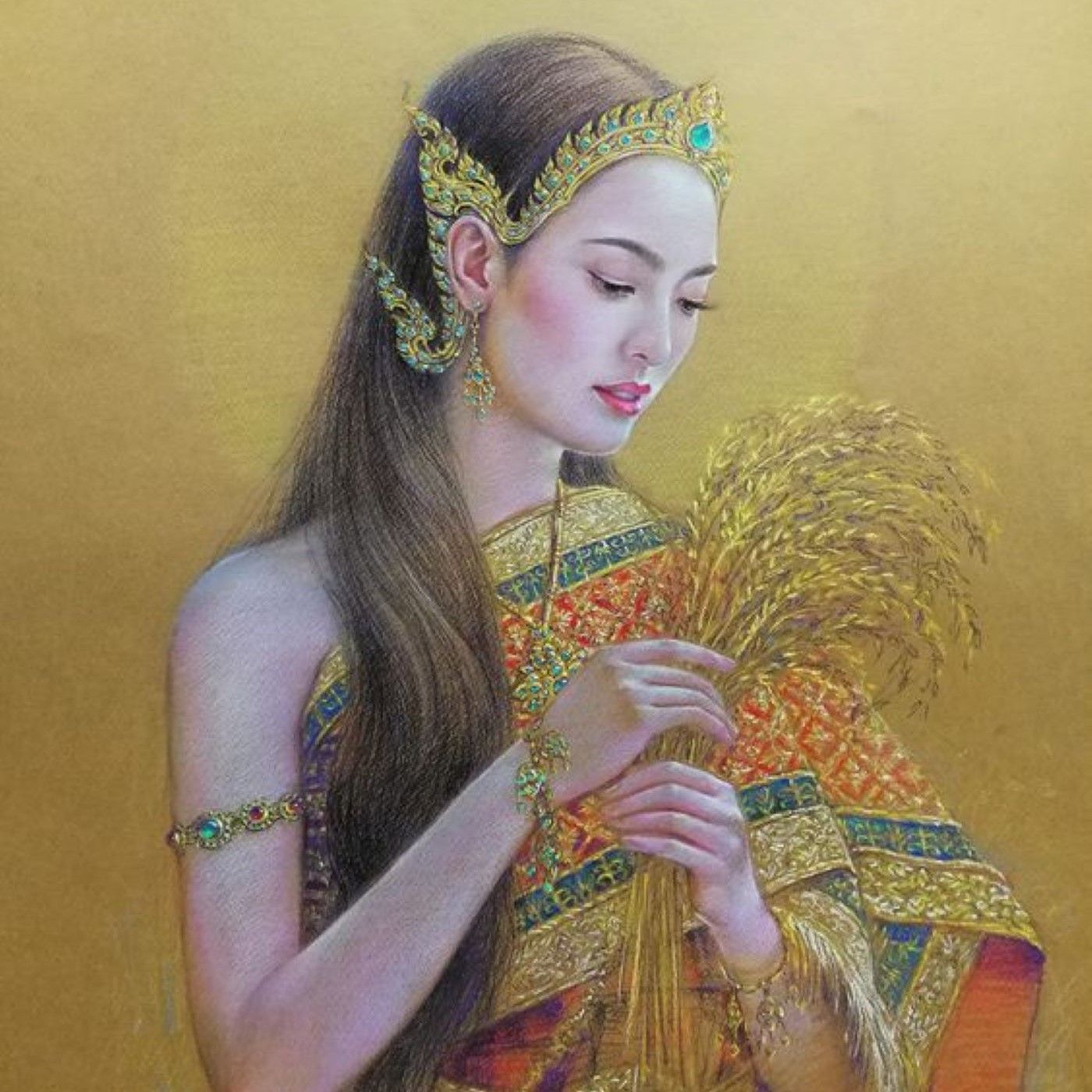
Dewi Sri - The Rice Goddess
Dewi Sri is not your usual goddess of grain and harvest. Born as a gift to the K -
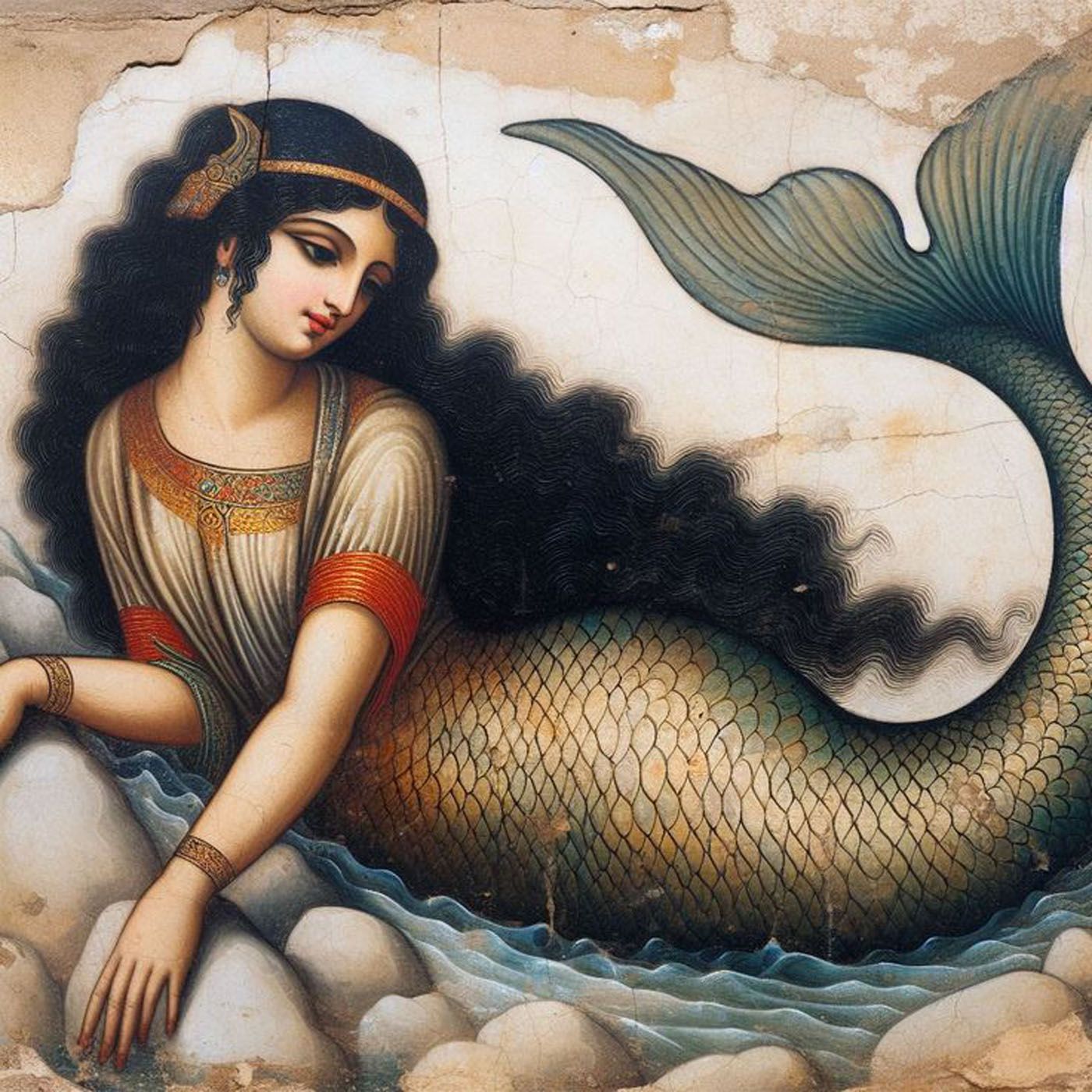
Atargatis - The First Mermaid
The powerful emotions of human life can lead to great transformations. Atargatis -
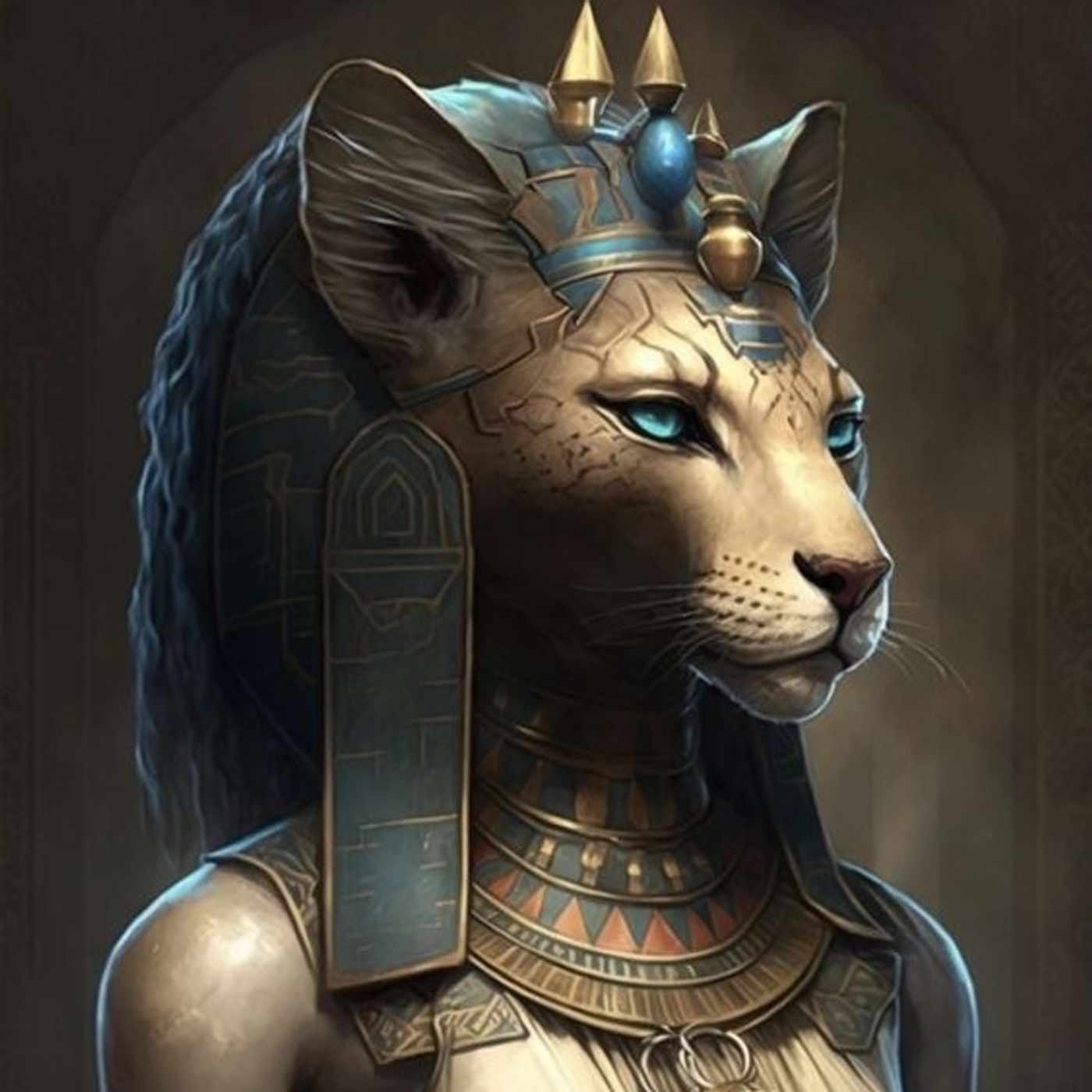
Sekhmet - The Lioness of Balance
The world and it's people live in a balance that is both fragile and all encompa -
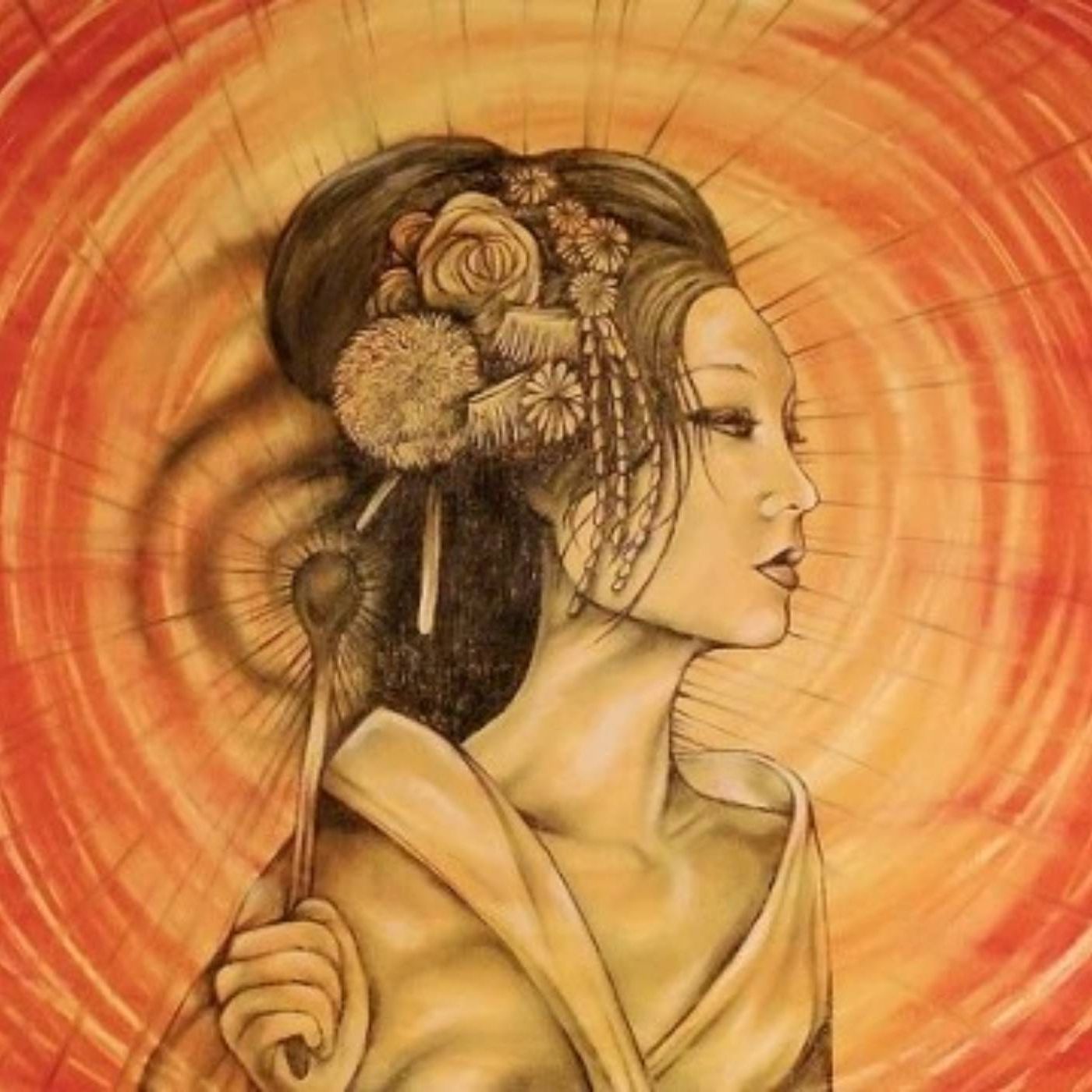
Amaterasu -The Goddess of Light
Amaterasu is the Japanese Goddess of Light. When Amaterasu is grief stricken and

